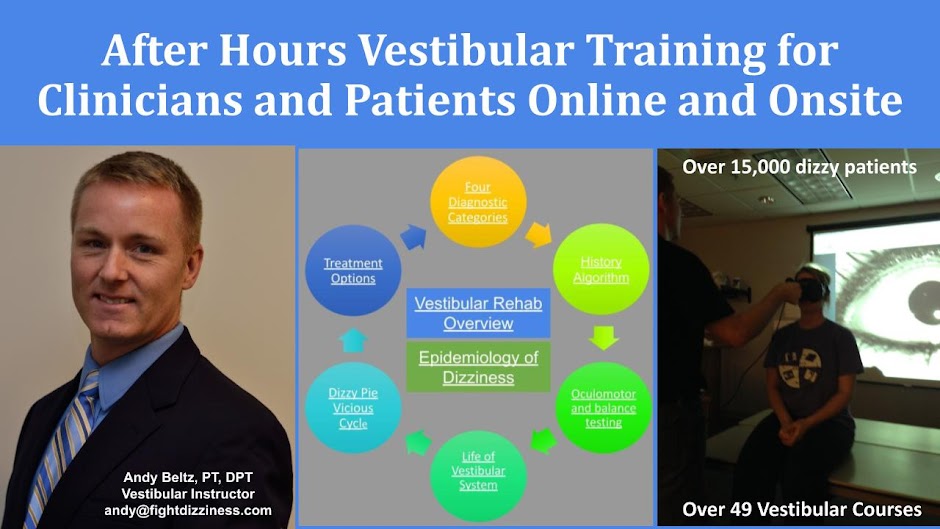not everyone's rocks are loose! We all have calcium carbonate crystals inside our inner ears. They shift forward and back and up and down to help us sense movement and the position of our heads. Sometimes they fall out from where they are supposed to be (Vestibule) and go where they are not supposed to be (Semicircular Canals). This condition is called Benign Paroxysmal Positional Vertigo. Physical Therapy is usually very helpful at correcting the problem if the problem does not correct itself.
It is important to not assume that just because one is dizzy that they have BPPV. There are many other causes of dizziness than BPPV. I think individuals, who have not been diagnosed by their Doctors, hear about BPPV and hope it is the cause of their problem. However, it is very important each individual receive a diagnosis from their Physician or the Emergency Department Physician if they are dizzy and do not know why.
Saturday, July 23, 2011
Thursday, July 21, 2011
The Dizziness "Interrogation"
Taking a good history on a client with dizziness requires focused attention to the verbal and non-verbal communication provided by the client and family members. I will sometimes have individuals describe dizziness as lightheaded, but use a circular motion with their hands at the same time. In this case, it is interesting to point out these two conflicting reports from the same individual. Once questioned, sometimes the individual will say they experience both spinning and lightheadedness.
Dizziness can be confusing to individuals so it is easy for individuals to get off track and lose focus during the subjective portion of the exam. Anxiety provoked symptoms and comments are not uncommon. Therefore, I warn my clients that I may need to interrupt them if I need more information about facts that they are providing. Sometimes, the questions I ask can be difficult to answer and sometimes clients may change their minds in regard to answers they have already provided. I have noticed tension build in individuals as they try to figure out what it is that they actually feel.
Sometimes I feel like I am interrogating individuals in regard to their problem. Understandably, this is necessary because of the complexity of dizziness as a problem. I am now up to 146 possible words/descriptions that people have provided to me when I ask them what dizzy means.
Dizziness can be confusing to individuals so it is easy for individuals to get off track and lose focus during the subjective portion of the exam. Anxiety provoked symptoms and comments are not uncommon. Therefore, I warn my clients that I may need to interrupt them if I need more information about facts that they are providing. Sometimes, the questions I ask can be difficult to answer and sometimes clients may change their minds in regard to answers they have already provided. I have noticed tension build in individuals as they try to figure out what it is that they actually feel.
Sometimes I feel like I am interrogating individuals in regard to their problem. Understandably, this is necessary because of the complexity of dizziness as a problem. I am now up to 146 possible words/descriptions that people have provided to me when I ask them what dizzy means.
Wednesday, July 20, 2011
"I'm dizzy, could it be from a stroke or tumor?"
One of the most common questions my client's ask me is in regard to whether or not I believe their dizziness could be from a stroke or brain tumor. In response to this question I usually first ask, "have you mentioned your concern about a brain tumor to your Doctor?" I think it is crucial clients talk openly about all of their symptoms and fears with their Medical Doctors. Once an individual has this concern on their mind, it is very important they diligently pursue an answer.
My next response is to review central signs that a brain tumor may cause. Some of these symptoms (in addition to various types of dizziness) may include: numbness, tingling, weakness, confusion, loss of hearing, loss of control of an extremity, slurred speech, blurred and/or double vision, seizures, spells of unconsciousness, difficulty swallowing and falling. Clients could also have other symptoms not mentioned.
As a vestibular therapist, my first priority is to ask questions and look for findings that may suggest a central vestibular problem.
My next response is to review central signs that a brain tumor may cause. Some of these symptoms (in addition to various types of dizziness) may include: numbness, tingling, weakness, confusion, loss of hearing, loss of control of an extremity, slurred speech, blurred and/or double vision, seizures, spells of unconsciousness, difficulty swallowing and falling. Clients could also have other symptoms not mentioned.
As a vestibular therapist, my first priority is to ask questions and look for findings that may suggest a central vestibular problem.
Tuesday, July 19, 2011
The Cardiovascular System and the Inner Ear
A healthy Cardiovascular System is crucial to assure the inner ear gets the nutrients it needs to work properly. The inner ear is tiny and, just like every other organ in our body, it relies heavily on a healthy heart, artery and venous system to regenerate and maintain balance. Individuals should communicate with their Doctor regularly, especially when dizzy, to make sure key elements like blood pressure and cholesterol levels are well controlled.
Subscribe to:
Posts (Atom)
